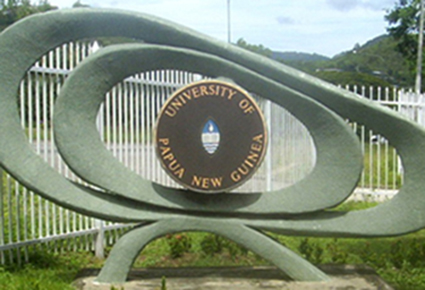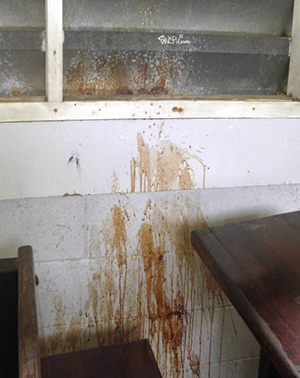
The University of Papua New Guinea will turn 50 this year. However, on the eve of its golden jubilee, the once premier university of the South Pacific is on the brink of losing its vault of knowledge and its academic reputation, writes Kela Kapkora Sil Bolkin.
COMMENTARY: One of Papua New Guinea’s most important national institutions, the University of Papua New Guinea (UPNG), is rotting away with time and ignorance.
According to official records, UPNG will turn 50 this year. However, on the eve of its golden jubilee, the once premier university of the South Pacific is on the brink of losing its vault of knowledge and its academic reputation.
During UPNG’s 56th graduation in 2011, Vice-Chancellor Professor Ross Hynes said that by 2015 UPNG would become the natural Papua New Guinean home of higher learning and research with all the necessary infrastructure and manpower.
He affirmed that the university administration had a master plan that would transform UPNG into a premier tertiary learning and research institution.
 On the threshold of 2015, I made two visits to UPNG, had a look around the campus and saw signs of deterioration and lack of effective management. It was evident the university did not even have the funds to employ cleaners or workers to do routine maintenance.
On the threshold of 2015, I made two visits to UPNG, had a look around the campus and saw signs of deterioration and lack of effective management. It was evident the university did not even have the funds to employ cleaners or workers to do routine maintenance.
I heard that almost every strand at UPNG is in crisis. Of particular note is economics. UPNG does not have any professors of economics. This has been the case for a long while now, despite UPNG being unique in offering undergraduate degrees in economics in Papua New Guinea.
For a developing country, the crisis in the economics strand runs counter to economic intelligence and savvy.
There are also no professors from China, the US or Europe teaching at UPNG to interact with local lecturers and broaden the scope of discussions with the wider world. This limits the opportunities for students to move on to PhD studies.
Run-down campus
Papua New Guinean PhD holders teaching at UPNG say they do not gain job satisfaction from teaching and moulding human capital. They return from "state of the art" learning facilities abroad to a run-down UPNG with inadequate internet access and find themselves losing enthusiasm for the job.
Many depart academia to pursue careers in state-owned enterprises and statutory bodies that pay well for their credentials. The more senior ones join mainline government departments, trying their luck on the rungs of the bureaucracy. Others pursue careers in politics.
These days electronic lecture rooms, computers and internet access, a library with the latest publications and the recruitment of top professors are prerequisites for advanced learning.
University rankings are calculated on the quality of teaching, research, knowledge transfer and international outlook. For UPNG to be in the mix of good universities, it needs to lure professors and other academics from around the world.
UPNG must be adequately and consistently funded and provided with a top management team. The university council must ensure that professors give lectures and PhD holders and candidates assist as tutors.
South Korea, Singapore, Japan, India, Brazil and other countries have invested heavily in higher education by pumping hundreds of millions of dollars into teaching, research and knowledge transfer. As a result these countries are now on par with first world countries: a lesson for Papua New Guinea to learn from and emulate.
The privatisation of UPNG is one option that may bring back quality. However, the sons and daughters of common subsistence farmers throughout the country would not be able to meet the exorbitant tuition fees that private universities charge.
Wealth-based admission
UPNG, once known for admitting students on merit, would shift to admission based on wealth; not a good option for Papua New Guinea.
If there is to be a gathering to commemorate its golden jubilee, then UPNG alumni and the general public must converge and protest against the demolition of the university through the accumulated ignorance by consecutive governments.
Former prime ministers such as Paias Wingti, Sir Rabbie Namaliu, Sir Mekere Morauta and the incumbent Peter O’Neill are alumnus of UPNG.
Invite them over and ask them politely how UPNG will contribute to achieving Vision 2050 with its stone-age facilities and lack of seasoned professors.
Better still, ask current Prime Minister Peter O’Neill why he wants to build a university in his isolated Pangia-Ialibu electorate when UPNG is literally a scarecrow and a national shame.
If the government can’t find professors for UPNG and renovate its learning facilities into user-friendly learning environments suitable for a 21st century world, how on earth can it contemplate building a Pangia-Ialibu university?
The Australian government should shift a greater portion of its aid to Papua New Guinea into rebuilding UPNG’s learning infrastructure and engaging enough professors to teach all the disciplines.
Poor peoples' asset
UPNG is an important national institution and a poor peoples’ asset. The sons and daughters of subsistence farmers have come to and graduated from this university and have gone on to successfully mingle with the best brains in the capitalist world.
The sum of human capital failures in Papua New Guinea has created a volatile socio-economic and political environment.
It is in the best interests of the people of Papua New Guinea that the proposal for the Ialibu-Pangia university be shelved and that much-needed investment be made in UPNG.
Happy golden jubilee celebrations, UPNG!
This article was an entry in the Crocodile Prize PNG Chamber of Mines and Petroleum Award for Essays and Journalism. It was first published on Keith Jackson's PNG Attitude.



